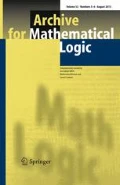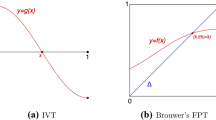Abstract
We prove an analogue of the fixed-point theorem for the case of definably amenable groups.
Similar content being viewed by others
Notes
In this paper we say that a topological group is amenable if it admits a left invariant finitely additive probability measure on the Borel subsets.
References
Chernikov, A., Simon, P.: Definably amenable NIP groups. arXiv preprint (2015)
Hrushovski, E., Peterzil, Y., Pillay, A.: Groups, measures, and the NIP. J. Am. Math. Soc. 21(2), 563–596 (2008)
Hrushovski, E., Pillay, A.: On NIP and invariant measures. arXiv preprint (2007)
Poizat, B.: Groupes stables une tentative de conciliation entre la géométrie algébrique et la logique mathématique (1987)
Rickert, N.W.: Amenable gropus and groups with the fixed point property. Trans. Am. Math. Soc. 127(2), 221–232 (1967)
Wagon, S.: The Banach-Tarski Paradox, vol. 24. Cambridge University Press, Cambridge (1993)
Acknowledgements
We would like to thank the referee for their numerous suggestions.
Author information
Authors and Affiliations
Corresponding author
Additional information
Publisher's Note
Springer Nature remains neutral with regard to jurisdictional claims in published maps and institutional affiliations.
Appendix
Appendix
1.1 Definability and \(\sigma \)-continuity
The notion of \(\sigma \)-continuity is very close to the one of definable map. In this paper we did not not make use of the latter, however it is worth to establish more precisely the relation between them.
Definition 8
Let Y be a definable set in a structure M and C a compact space. A map \(f:Y\rightarrow C\) is definable if for every disjoint closed sets \(C_1\) and \(C_2\) there exists \(Y'\) definable such that \(f^{-1}(C_1)\subset Y'\) and \(Y'\cap f^{-1}(C_2)=\emptyset \).
From the proof of Theorem 4 we have the following characterization of definable functions:
Corollary 1
Let X be definable in a structure M, C be a compact space, and \(f : X \rightarrow C\). Then we have the following properties.
-
1.
Suppose M is \(\omega _1\)-saturated. If f is \(\sigma \)-continuous, then f is definable.
-
2.
Suppose C is second-countable. If f is definable, then f is \(\sigma \)-continuous.
Rights and permissions
About this article
Cite this article
Carmona, J.F., Dávila, K., Onshuus, A. et al. A fixed-point theorem for definably amenable groups. Arch. Math. Logic 60, 413–424 (2021). https://doi.org/10.1007/s00153-020-00748-1
Received:
Accepted:
Published:
Issue Date:
DOI: https://doi.org/10.1007/s00153-020-00748-1




